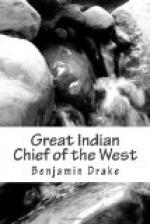Black Hawk is mistaken in some things about this treaty, and it may be that he has been misinformed in regard to the authority of his chiefs to make this sale of their lands. He says, for instance, that the treaty was made some moons after the return of Lieutenant Pike from the sources of the Mississippi; when in fact Pike did not leave St. Louis upon his expedition, until the 9th of August 1805, nearly a year after the date of the treaty. Again, he says, it was made by four of the chiefs. The treaty is signed by five. But admitting that the deputation of chiefs transcended their authority in the sale of the lands, made at that time, it would seem that the Sacs and Foxes acquiesced in it. They never disavowed the treaty, but have regularly received their annuity, and, on more than one occasion, have recognized it, as binding. Even Black Hawk and his band, made this recognition, in the treaty of peace which they signed with the United States, at Portage des Sioux, in 1816.
It may be questioned, however, whether good faith towards the Indians and a due regard to national honor, do not make it expedient that our government should invariably hold its treaties with them, in their own country, and in the midst of the tribe owning the lands proposed to be purchased. In such case, the assent of all the Indians might be obtained, and the charge of having formed a fraudulent treaty, with unauthorized individuals, could never be raised. The peculiar relation subsisting between the government of the United States and the Indian tribes, within its territory, demands on on the part of the former, great delicacy of action, liberality and perfect good faith. By such a course, alone, can our national honor be preserved untarnished.




